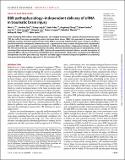BBB pathophysiology–independent delivery of siRNA in traumatic brain injury
Author(s)
Li, Wen; Qiu, Jianhua; Li, Xiang-Ling; Aday, Sezin; Zhang, Jingdong; Conley, Grace; Xu, Jun; Joseph, John; Lan, Haoyue; Langer, Robert; Mannix, Rebekah; Karp, Jeffrey M; Joshi, Nitin; ... Show more Show less
DownloadPublished version (7.725Mb)
Publisher with Creative Commons License
Publisher with Creative Commons License
Creative Commons Attribution
Terms of use
Metadata
Show full item recordAbstract
Copyright © 2021 The Authors, some rights reserved. Small interfering RNA (siRNA)–based therapeutics can mitigate the long-term sequelae of traumatic brain injury (TBI) but suffer from poor permeability across the blood-brain barrier (BBB). One approach to overcoming this challenge involves treatment administration while BBB is transiently breached after injury. However, it offers a limited window for therapeutic intervention and is applicable to only a subset of injuries with substantially breached BBB. We report a nanoparticle platform for BBB pathophysiology–independent delivery of siRNA in TBI. We achieved this by combined modulation of surface chemistry and coating density on nanoparticles, which maximized their active transport across BBB. Engineered nanoparticles injected within or outside the window of breached BBB in TBI mice showed threefold higher brain accumulation compared to nonengineered PEGylated nanoparticles and 50% gene silencing. Together, our data suggest that this nanoparticle platform is a promising next-generation drug delivery approach for the treatment of TBI.
Date issued
2021Department
Massachusetts Institute of Technology. Department of Chemical Engineering; Koch Institute for Integrative Cancer Research at MIT; Harvard University--MIT Division of Health Sciences and TechnologyJournal
Science Advances
Publisher
American Association for the Advancement of Science (AAAS)